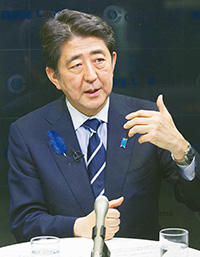


On July 6, Prime Minister Shinzo Abe began appearing on a series of special program broadcast on "CafeSta," the Party's internet live stream studio, to help people gain a better understanding of the proposed peace and security legislation. Paired with various LDP Diet members in each appearance, he explained the purposes of the legislation and the limited exercise of the right of collective self-defense. We have summarized the highlights below.
The peace and security legislation prepares for the unforeseeable
It is unfortunate that the peace and security legislation has attracted the image of "a war bill" and "something scary."
The purpose of the legislation is to protect the lives and property of the Japanese and to work together with other countries (for the stability of the international community). Its purpose is not to go to war. There is no one in the LDP, not a single person, who wants war.
This legislation is to prepare us for unforeseen circumstances at a time when the security environment is becoming increasingly challenging. People lock their doors, and that discourages thieves. Where people work together in their communities, you find less crime.
The Japan Maritime Self-Defense Force is working in cooperation with other countries to deal with piracy off the coast of Somalia; zero attacks were recorded during the first half of this year. That is the result of deterrence.
Strengthening the Japan-US alliance to stabilize the region
International law is clear; Japan has the right of collective self-defense. One plus one must equal two (in the Japan-US alliance) or enemies will perceive that vulnerabilities exist. Not showing vulnerabilities is how we will bring greater stability to the region.
The limited exercise of the right of collective self-defense is constrained by the "three new conditions." No other country in the world imposes these requirements. Obviously, our alliance partner, the United States, understands this.
Japan is an independent country and does not merely do as it is told by the United States. We would not send the Self-Defense Forces to fight in conflicts like the Vietnam War, Iraq War, or the Gulf War in the past. They exceed the minimums (defined in the three conditions). Let me state clearly that this (the Constitutional interpretation of limited exercise) is the limit.
We will continue to reduce the risks for the Self-Defense Forces
The job of the Self-Defense Forces is to protect the lives and peaceful livelihoods of the people, and it always entails risk.
Some would argue that "the proposed legislation gives (the Self-Defense Forces) new authority and responsibility, and also increases the risks." However, this is not a simple case of one plus one plus one equaling three.
Up to this point, we have passed special legislation to deal with emergency circumstances, but having permanent legislation in place will enable us to cooperate with other countries on intelligence gathering, training, and education during peacetime as well as conflict. It will also make UN Peacekeeping Operations (PKO) safer by allowing our forces to work with the militaries of other country to protect our bases.
There must be a comprehensive judgment (of risk). We must continue our efforts to reduce risk of the Self-Defense Forces. We want to pass this legislation as a way of reducing risk for the people.
Constitutional scholars and politicians have different roles and responsibilities
We must listen closely to the opinions offered by constitutional scholars, but constitutional scholars have different roles and responsibilities than those of politicians. The Constitution lacks explicit wording, but the Supreme Court has ruled (in the Sunagawa Decision) that Japan has the right of self-defense. We have a responsibility to take appropriate measures for self-defense and protect both our people and our country.
Times have changed (from the government interpretation of 1972 concerning the right of individual self-defense as a necessary defensive measure). We have seen advances in weaponry, changes in international circumstances, and changing relationships among countries; Japan must provide for its defense within this context. We have a responsibility to think through these issues. Abandoning this responsibility would be an abdication of our roles as lawmakers.
Lawmakers must make decisions. Without decisions, there would be no Self-Defense Forces, no Japan-US Security, and no PKO Act. The peace and security legislation is the result of intensive thought and study.










